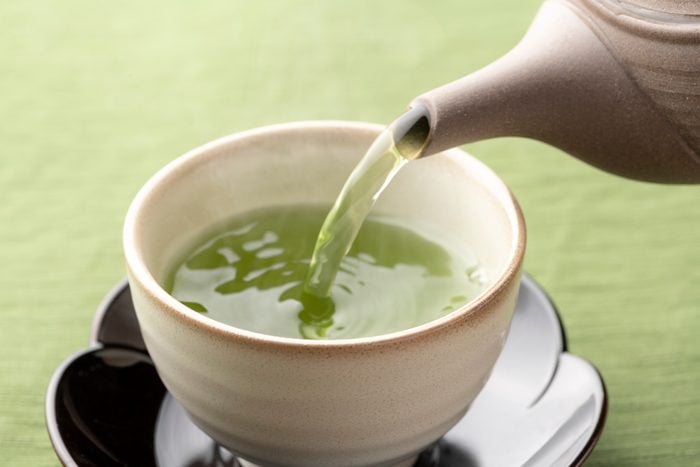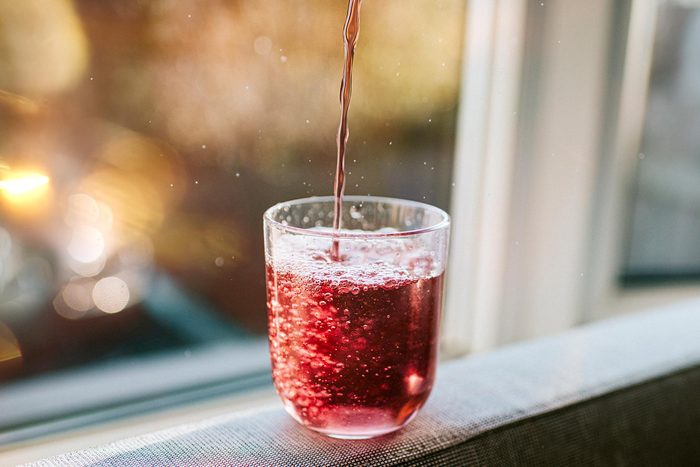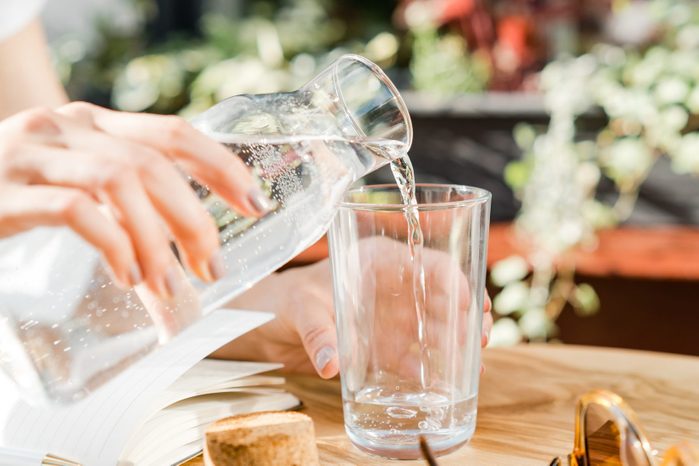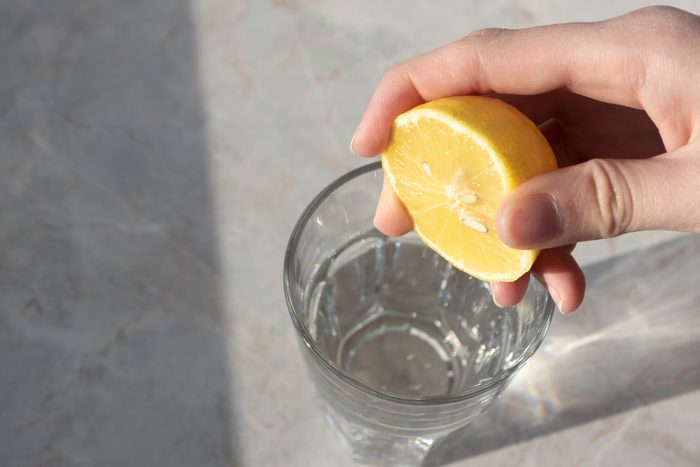 CATHERINE FALLS COMMERCIAL/GETTY IMAGES
CATHERINE FALLS COMMERCIAL/GETTY IMAGES
‘Tis the season for over-saturating your system. Knowing about these beverages could support your liver health—and find out: do you really need a detox or juice cleanse?
The liver plays a major role in the body’s detoxification process—an important function year-round, but especially at a time of year when we’re toasting the bubbly and eating heavy foods.
Some hepatologists (that’s the medical term for liver doctor) suggest that it’s actually not essential to engage in a cleanse or detox. That’s because if you’re generally healthy, the liver itself is your most effective detox tool. “The liver is self-cleaning, so you don’t need to clean your liver,” Nancy Reau, MD, associate director of Solid Organ Transplantation and Section Chief of Hepatology at Rush University Medical Center in Chicago, IL, tells The Healthy @Reader’s Digest. “It’s busy cleaning your blood.”
But, Dr. Reau says, there are some ways you can support your liver so it keeps performing for you to the best of its ability. As a board-certified holistic nutritionist, I often recommend being mindful of—or even reducing—alcohol consumption…especially during a season when it can seem like the drinks are flowing everywhere you go.
Dr. Reau suggests another wise way to support the health of your liver (and therefore possibly your general wellness) is to increase your intake of beverages that will keep your system running optimally. This list of liver-healthy beverages, recommended by Dr. Reau and other doctors and nutrition specialists, can help support your liver health sip-by-sip.

Drinks That Support The Liver
Coffee and tea drinkers, good news! Melissa Prest, MS, RD and spokesperson for the Academy of Nutrition and Dietetics, tells The Healthy @Reader’s Digest:“Coffee and tea have been researched [in connection] with liver health, and both are beneficial.”
Prest says green tea, in particular, is a great choice to start your day with a burst of liver wellness. “Green tea has been reported to improve liver enzymes in people with nonalcoholic liver disease.” How much green tea is recommended? Prest says, “People who drink four or more cups a day have a lower risk of developing liver cancer.”
So what about the health benefits of coffee for your liver? “Coffee may reduce the risk of cirrhosis, developing liver cancer, and improving inflammation. People with chronic liver disease who consumed three or more cups of coffee a day have been reported to have a lower risk of death,” Prest says.

What Juices Cleanse The Liver?
Over the years there have been a lot of different juice cleanses marketed…but do they actually cleanse the liver?
“I know there are a lot of random things about ‘liver cleanse’ or ‘detox’ out there. There are no juices or foods that ‘cleanse’ or repair the liver,” says Michelle Lai, MD, MPH, author of the Liver Healing Diet.
Instead, Prest emphasizes that a healthy diet followed regularly is more important than a juice cleanse. “Your liver is a powerhouse that benefits from eating a diet that supports its functions, versus doing a juice cleanse,” she says. “Focus on a whole foods diet that is rich in antioxidant-rich foods, high-fiber foods, vitamin E, and lean proteins. You can also help protect your liver by being mindful of your environmental toxins like insecticides and cleaning sprays that can cause damage to your liver. Use them safely by wearing a mask and gloves in a well-ventilated area.”
Dr. Reau agrees. She suggests there’s not one juice or cleanse that can clean the liver—but there are are juices that can support the liver. “Juices with fruits and vegetables are high in antioxidants and should be liver-friendly. Common ingredients would include berries, ginger and pomegranate. But fruit juices can have a lot of calories and may not make you feel full. So be careful, and balance juices along with the rest of your healthy diet,” Dr. Reau says.

What Can I Drink To Flush My Liver?
Says Dr. Lai: “The liver keeps itself healthy and can repair itself when you take care of it by not introducing harmful substances such as alcohol, excess sugar and excess calories. So you can’t have a heavy night of drinking alcohol and overeating, and drink lemon water and expect the liver to be OK.”
Water might be the easiest and best place to start when thinking about the best drinks for your liver. “Water is the best at keeping your body well hydrated and allowing your vital organs, like your liver, to do their jobs,” Prest says. “If you are not drinking enough water aim to double your water intake to support your overall health, and especially your liver health.”
Prest warns us to “be mindful of dietary supplements. For example, green tea extract in supplements has been reported to cause liver damage.”
Another rule? “You want to avoid high carbohydrate liquids—no soda or sweet tea,” says Dr. Reau.

Does Lemon Water Detox Your Liver?
Yes, lemons have a lot of vitamins and polyphenols—but do they help to detox your liver? “There aren’t great trials that prove that lemon water is beneficial,” Dr. Reau said. “The most important message is that lemon water is safe and it should never be used in an attempt to erase a liver injury or you shouldn’t feel that you can eliminate alcohol injury in your liver after a binge by drinking lemon water.”
Prest adds, “It will not do much by way of detoxing the liver, but if adding lemon to your water helps you to drink more water then there is the benefit of hydration which is important for the liver.”

While research shows a healthy intake of water, coffee and green tea can boost liver function, the key takeaway is that a holistic approach to your diet and health has positive effects on all of your internal organs. Keep this balance in mind, and your body will be in harmony inside and out!
Sources
- Michelle Lai, MD, MPH. Associate Professor of Medicine, Harvard Medical School. Director of Transplant Hepatology Fellowship. Director of BIDMC NAFLD Center Division of Gastroenterology/Hepatology. Author of The Liver Healing Diet
- Nancy Reau, MD. Professor of Medicine. Richard B. Capps Chair of Hepatology. Chief, Section of Hepatology . Associate Director, Solid Organ Transplantation. Rush University Medical Center
- Melissa Prest is a Chicago-based registered dietitian nutritionist and media spokesperson for the Academy of Nutrition and Dietetics. Her Twitter handle is @windycityRD
- https://www.ncbi.nlm.nih.gov/pmc/articles/PMC6776700/
- https://www.ncbi.nlm.nih.gov/pmc/articles/PMC5440772/
Important Notice: This article was originally published at www.thehealthy.com by Katie Bressack where all credits are due.
Disclaimer
The watching, interacting, and participation of any kind with anything on this page does not constitute or initiate a doctor-patient relationship with Dr. Farrah™. None of the statements here have been evaluated by the Food and Drug Administration (FDA). The products of Dr. Farrah™ are not intended to diagnose, treat, cure, or prevent any disease. The information being provided should only be considered for education and entertainment purposes only. If you feel that anything you see or hear may be of value to you on this page or on any other medium of any kind associated with, showing, or quoting anything relating to Dr. Farrah™ in any way at any time, you are encouraged to and agree to consult with a licensed healthcare professional in your area to discuss it. If you feel that you’re having a healthcare emergency, seek medical attention immediately. The views expressed here are simply either the views and opinions of Dr. Farrah™ or others appearing and are protected under the first amendment.
Dr. Farrah™ is a highly experienced Licensed Medical Doctor certified in evidence-based clinical nutrition, not some enthusiast, formulator, or medium promoting the wild and unrestrained use of nutrition products for health issues without clinical experience and scientific evidence of therapeutic benefit. Dr. Farrah™ has personally and keenly studied everything she recommends, and more importantly, she’s closely observed the reactions and results in a clinical setting countless times over the course of her career involving the treatment of over 150,000 patients.
Dr. Farrah™ promotes evidence-based natural approaches to health, which means integrating her individual scientific and clinical expertise with the best available external clinical evidence from systematic research. By individual clinical expertise, I refer to the proficiency and judgment that individual clinicians acquire through clinical experience and clinical practice.
Dr. Farrah™ does not make any representation or warranties with respect to the accuracy, applicability, fitness, or completeness of any multimedia content provided. Dr. Farrah™ does not warrant the performance, effectiveness, or applicability of any sites listed, linked, or referenced to, in, or by any multimedia content.
To be clear, the multimedia content is not intended to be a substitute for professional medical advice, diagnosis, or treatment. Always seek the advice of your physician or other qualified health providers with any questions you may have regarding a medical condition. Never disregard professional medical advice or delay in seeking it because of something you have read or seen in any website, video, image, or media of any kind. Dr. Farrah™ hereby disclaims any and all liability to any party for any direct, indirect, implied, punitive, special, incidental, or other consequential damages arising directly or indirectly from any use of the content, which is provided as is, and without warranties.

